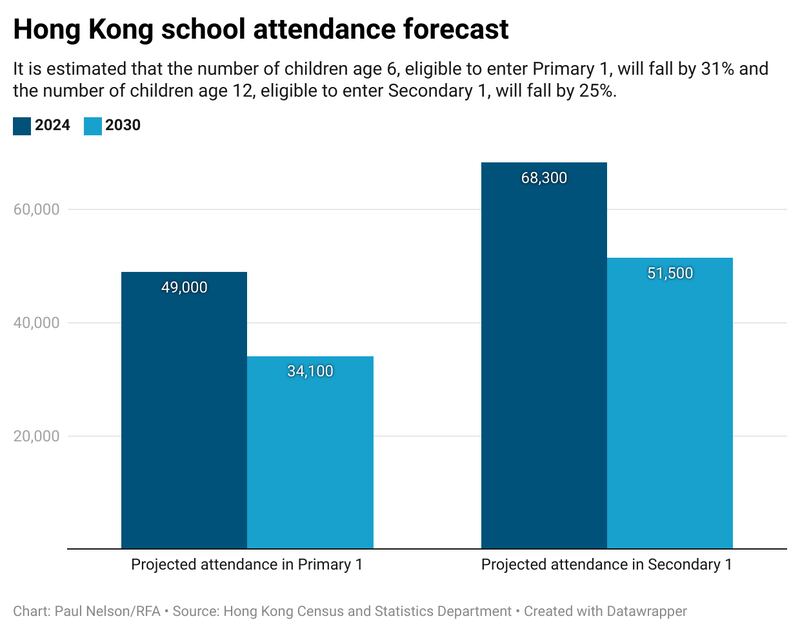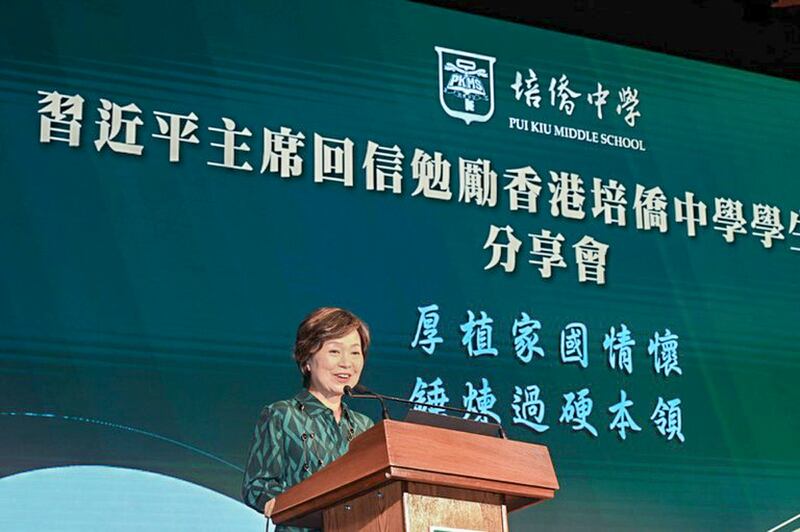Hong Kong is expecting a sharp fall in the number of primary-school-aged children following a mass exodus of middle-class families fleeing a crackdown on political dissent.
The city's Bureau of Education estimates, based on August 2023 population data from the Census and Statistics Department, that the number of 6-year-olds will fall by 31% from 49,600 in 2024 to 34,100 in 2030.
Many who have left the city did so citing political repression under a draconian security law, along with what they regard as the brainwashing of children in the form of "patriotic" and " national security" classes that are now mandatory from kindergarten to university, as the government encourages people to inform on each other.
Birth rates in Hong Kong began declining in 2014, but plummeted sharply in the wake of a 2019 pro-democracy protest movement and subsequent political crackdown, reaching their lowest level since 1960.
While the population showed a slight uptick following the scrapping of COVID-19 travel curbs, birth rates in the city haven't caught up, with the number of newborns falling by 38% between 2019 and 2022, according to government data.

Lawmakers called on Secretary for Education Christine Choi on July 5 to do something to reverse the trend and stave off what they termed the "decline" of Hong Kong, media reported.
Choi, who is seeking to promote smaller class sizes as school-age populations fall, said her department would be brokering mergers between schools in a bid to engineer a "soft landing" for the city's education over the next few years.
She said the government was hoping to attract 100,000 migrants to Hong Kong under talent and labor schemes, in a bid to fuel population growth over the next two decades.
By 2046, 50 years after the 1997 handover of the then British colony to Chinese rule, Hong Kong is hoping to attract a net inflow of permanent residents numbering almost 900,000, with just over half a million non-permanent residents.
To that end, the government has been handing out free plane tickets to visitors and offering work visas to attract professionals, many from mainland China, to replace those who have left.
Net departures of permanent residents from Hong Kong totaled 113,000 for the whole of 2022, prompting calls from media backed by the Communist Party for the government to act to stem the brain drain.
Education blogger Yeung Wing Yu, who runs the @edulancet Instagram account, said Hong Kong's allure for expat families, even those relocating from mainland China, was on the wane.
Meanwhile, school numbers have been hit hard by the wave of emigration. "Primary years five and six are the hardest hit," Yeung said. "Many students have left Hong Kong schools and emigrated overseas."
Those who do come in on talent schemes will likely send their children to high-profile schools with a strong reputation for "patriotic education," while other schools will be left to flounder and eventually close, Yeung said.
"The situation in Hong Kong's education system has been created by the Education Bureau since 2020," Yeung said, in a reference to the passing of Hong Kong's first National Security Law and its imposition of a China-inspired patriotic education program in schools.
Letter from Xi
Last month, the Education Bureau sparked a public backlash when it criticized Hong Kong's schoolchildren for their "weak" singing of China's national anthem, the "March of the Volunteers," at flag-raising ceremonies that are now compulsory as part of patriotic "national security" education from kindergarten through to universities.
"Our education system is no longer very different from the system in mainland China," Yeung said. "Patriotic education here is even more exaggerated than in the mainland."
"If you are caught making faces while singing the national anthem at a football game in Hong Kong, you will be arrested, then it becomes a negative news story about Hong Kong," he said.
Hong Kong passed a law in 2020 making it illegal to insult China's national anthem on pain of prison for up to three years, following a series of incidents in which Hong Kong soccer fans booed their own anthem.
Meanwhile, city officials are holding events to encourage praise for ruling Chinese Communist Party leader Xi Jinping.
The Education Bureau on Monday held an event at Pui Kiu Middle School to mark the first anniversary of the school's receipt of a letter from Xi.
"Over the year, the Bureau has been striving to live up to the spirit of President Xi's reply letter and nurture young people's affection for and sense of belonging to the country," Choi told the gathering, promising a wider variety of school trips to mainland China, including exchange programs and study tours.

Secondary school students now take part in military-style activities at a national defense education facility in the southern province of Guangdong and "cultivate patriotism and enhance national security awareness," the Beijing-backed Wen Wei Po newspaper reported in September 2023, citing a circular sent to schools by the Hong Kong Education Bureau.
More than 930 government schools in Hong Kong have been twinned with schools in mainland China, Choi said.
Yeung said the session at the Pui Kiu Middle School resembled the "songs of praise" for late supreme leader Mao Zedong during China's Cultural Revolution of 1966-1976, adding that commemorative books were handed out to students.

"Last year, Xi Jinping wrote a letter ... and one year later, Pui Kiu Middle School already has a special status within the Hong Kong education system," he said. "I expect we'll see more pilgrims visiting the school in future."
Yeung said some Hong Kong schools, which mostly teach in the city's lingua franca, Cantonese, will likely need to switch to Mandarin as a medium of instruction to cater to mainland Chinese students.
Translated by Luisetta Mudie. Edited by RFA staff.
